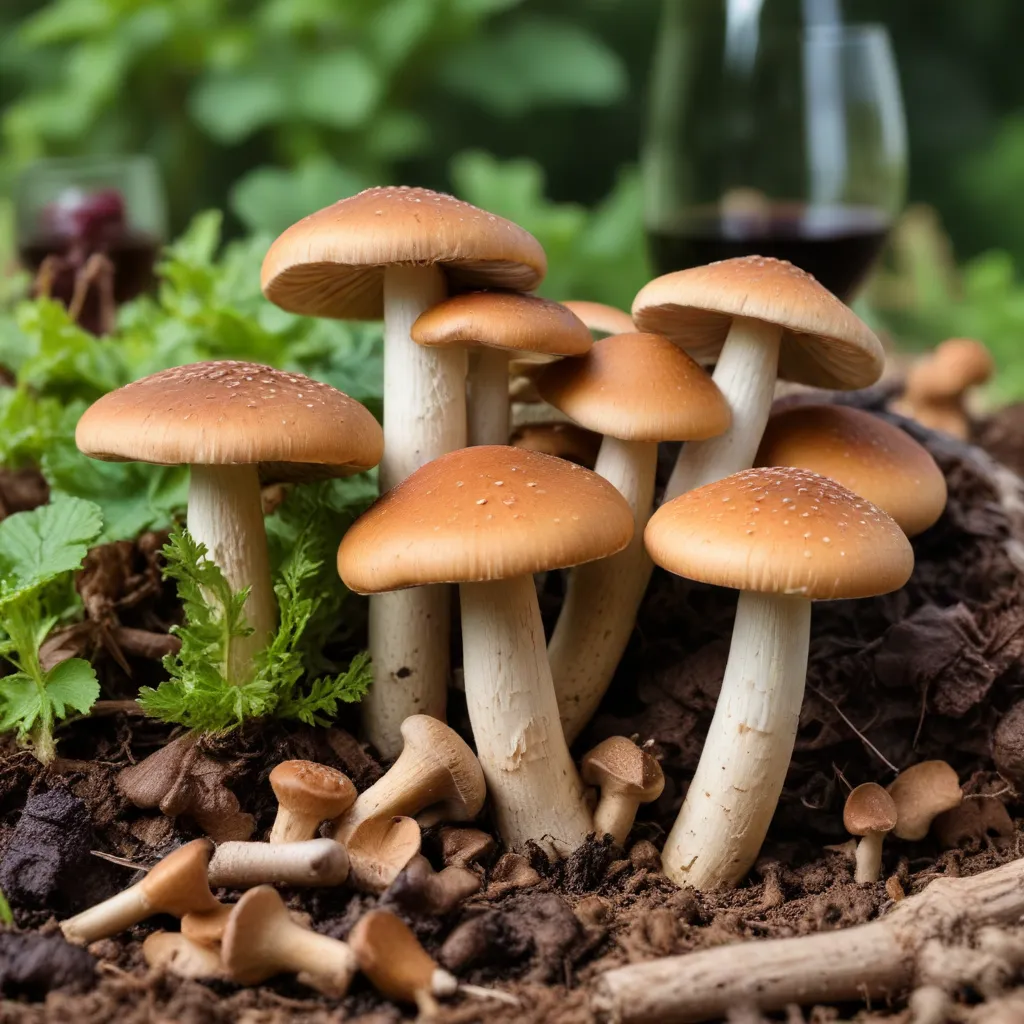
Gardening for Flavor: Cultivating Edible Mushrooms to Complement Wine Pairings
At the Wine Garden Inn, we firmly believe that the culinary journey is an integral part of the wine tasting experience. As a vintner and hospitality expert, I’m thrilled to share insights on how you can elevate your meals by cultivating edible mushrooms in your own garden. Not only do these diverse fungi add savory umami notes to dishes, but they also serve as the perfect complement to our carefully curated wine selection.
Cultivating Edible Mushrooms
Mushrooms are a fascinating and versatile ingredient, offering a wide range of flavors, textures, and nutritional benefits. When it comes to pairing them with wine, certain varieties stand out for their culinary excellence. Shiitake mushrooms, with their rich, earthy taste and firm, meaty texture, pair beautifully with bold red wines, while the delicate, slightly sweet oyster mushrooms complement lighter, more delicate white wines. Crimini and portobello mushrooms, on the other hand, offer a more versatile flavor profile that can enhance a diverse array of wine styles.
Cultivating edible mushrooms at home requires specific environmental conditions and growing media. Hardwood logs, straw, or sawdust-based substrates provide the ideal foundation for many species, while maintaining the proper temperature, humidity, and air circulation is crucial for successful fruiting. Investing in a dedicated mushroom growing setup, whether it’s an outdoor patch or a climate-controlled indoor space, can yield a bountiful harvest of these culinary delights.
Harvesting and preserving your homegrown mushrooms is also an important consideration. Gently brushing off any dirt or debris, and carefully cutting the stems at the base, will ensure the highest quality and freshness. For long-term storage, dehydrating or freezing the mushrooms are excellent options that preserve their flavor and texture.
Wine Pairing Considerations
When it comes to pairing mushrooms with wine, it’s essential to consider the unique flavor profiles of both. The savory, umami-rich characteristics of mushrooms can either complement or contrast with the various taste attributes of different wine varieties.
For instance, the earthy, nutty notes of Shiitake mushrooms pair beautifully with the bold, full-bodied flavors of a Cabernet Sauvignon or a Malbec. Conversely, the delicate, delicate flavors of oyster mushrooms harmonize exquisitely with the crisp acidity and floral aromas of a Sauvignon Blanc or a Riesling.
By understanding the interplay between mushroom and wine flavors, you can create truly remarkable dining experiences. The key is to seek out complementary taste attributes, where the individual elements enhance and elevate one another, resulting in a symphony of flavors that captivates the senses.
Flavor Development in Edible Mushrooms
The depth and complexity of flavor in edible mushrooms are influenced by a multitude of factors, from the composition of the growing substrate to the post-harvest handling techniques.
The substrate, which can range from recycled agricultural waste to sustainably sourced wood chips, plays a crucial role in shaping the mushroom’s flavor profile. The availability of nutrients, the presence of specific microbial communities, and the soil acidity all contribute to the development of unique taste attributes.
Environmental conditions during the cultivation process also have a significant impact. Factors such as temperature, humidity, and air circulation can influence the production of aromatic compounds and the overall texture and mouthfeel of the mushrooms.
Interestingly, the umami characteristics of edible mushrooms are largely attributed to the presence of glutamates and other savory flavor compounds. By understanding and manipulating these elements, mushroom growers and chefs can enhance the inherent umami notes, creating dishes that seamlessly integrate with the complexities of fine wines.
Sustainable Mushroom Cultivation
At the Wine Garden Inn, we are committed to sustainable and environmentally-friendly practices in all aspects of our operations, including the cultivation of edible mushrooms. By utilizing renewable and recycled growing media, minimizing energy and water consumption, and promoting biodiversity, we strive to produce high-quality mushrooms while maintaining the health of our local ecosystem.
Integrated pest management strategies, such as the use of biological control methods and natural deterrents, also play a crucial role in our mushroom cultivation practices. By creating optimal growing environments and addressing potential threats proactively, we ensure the long-term viability of our mushroom production while minimizing the reliance on harmful chemicals.
The Art of Mushroom-Wine Pairing
Elevating the dining experience through the harmonious pairing of mushrooms and wine is an art form that we at the Wine Garden Inn have perfected over the years. By understanding the nuances of flavor synergies, we are able to create a sensory experience that delights and captivates our guests.
When exploring these pairings, we focus on identifying complementary flavor notes, balancing the intensity and complexity of both the mushrooms and the wine. A delicate oyster mushroom, with its subtle, almost sweet taste, can beautifully accentuate the crisp acidity and floral aromas of a Sauvignon Blanc, while a robust portobello mushroom, with its earthy and savory qualities, can elevate the bold, structured flavors of a Cabernet Sauvignon.
In addition to these flavor considerations, we also pay close attention to the presentation and serving of our mushroom-wine pairings. Carefully plating the mushroom dishes, selecting the appropriate glassware, and ensuring the optimal serving temperature all contribute to the overall harmony of the experience.
By seamlessly integrating the cultivation of edible mushrooms with our passion for exceptional wine, we at the Wine Garden Inn are able to offer our guests a truly remarkable culinary journey. Whether you’re a seasoned oenophile or an aspiring home gardener, we invite you to explore the boundless possibilities of this flavorful partnership.
